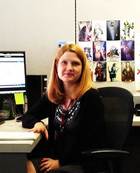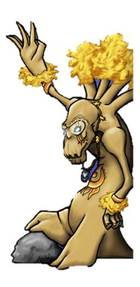
Name Loni Huff
- Education B.S. Information Systems and Decision Sciences, Louisiana State University
- Target Audience Undergraduate

English, C#, VB.net, JavaScript, jQuery, PHP... all languages used by web developer, Loni Huff. Read on to learn more about programming and the codes that Huff lives by.
 I'm an Applications Systems Analyst, also known as a software developer, web developer or programmer. I create web-based software using .NET, the development framework created by Microsoft. I currently work on a web application used to manage capital projects at MD Anderson Cancer Center. These projects can be anything from the relatively low-budget renovation of existing spaces to the multi-million dollar construction of a new building.
I'm an Applications Systems Analyst, also known as a software developer, web developer or programmer. I create web-based software using .NET, the development framework created by Microsoft. I currently work on a web application used to manage capital projects at MD Anderson Cancer Center. These projects can be anything from the relatively low-budget renovation of existing spaces to the multi-million dollar construction of a new building.
A sub-set of the clients who use our application make requests for changes and additions to its functionality. We work with a business analyst to formalize these requests into a set of concrete requirements. In the case of adding entirely new functionality, we have a great deal of flexibility in terms of how new features should look and perform. This allows for greater creativity than the requests to change existing functionality. Changes to existing features are more structured since users are already familiar with how a given feature looks and functions and too drastic a change risks confusing the user. Finally, we research and troubleshoot bugs - problems related to unintended flaws in program logic or data processing. It might sound like the most boring aspect of what I do, but finding and fixing bugs can be as rewarding as solving a puzzle.
Web development can be both creative and meticulous at the same time. I think creativity and attention to detail are large parts of my personality, which is probably why I enjoy web development so much. What I love most about my current job is that I have a lot of freedom as the sole developer in charge of front-end user experience.
I really enjoyed math while I was attending a school that had accelerated math classes. However, when I changed schools, my new school didn't have the same type of advanced math, and I ended up repeating a lot of the material I had already learned. That experience left me frustrated, and I couldn't maintain the same level of interest that I had before.
From a really young age, I was interested in many things my peers were not. When I was a kid, it was unusual for girls to like computer games and comic books, and if you did (and admitted to it), you were an outcast. Then, along came the internet and suddenly I was able to connect with lots of kids - other girls in particular - who enjoyed the same things I did. I spent time online learning the basics of web design and increasing my computer savvy, which was really just a byproduct of my efforts to connect with other people like myself.
girls to like computer games and comic books, and if you did (and admitted to it), you were an outcast. Then, along came the internet and suddenly I was able to connect with lots of kids - other girls in particular - who enjoyed the same things I did. I spent time online learning the basics of web design and increasing my computer savvy, which was really just a byproduct of my efforts to connect with other people like myself.
My sophomore year in college, I joined an online guild for the computer game I was playing and offered to design the organizational website. At the time, I didn't have much development experience, but another member was a Windows developer, and he helped me make the website more dynamic. That experience opened my eyes to how much better a web site can be with a database behind it. It reinforced what I already knew, which was that my interests were grounded in technology. That was probably about the time I switched my major - originally English - to Information Systems.
After my decision enroll in the Information Systems program, my boyfriend - then a Computer Science major - frequently hassled me about my choice of degree. He felt that if I wanted to be a programmer, I would need a Computer Science degree. I eventually gave into the pressure and switched my major to Computer Science. While in the Computer Science program, I had a bad experience with a particular professor. That bad experience, coupled with a few CS courses that I didn't enjoy, caused me to eventually return to Information Systems. In the end, IS ended up being a great fit because I was exposed to business principals while still learning to program. I think Information Systems is a good degree for someone who wants to work in technology but wants a multidisciplinary education experience. What I learned from my experience in college is that you can't let someone else's ego dictate your choices.
When I graduated, I had a programming background but very limited experience in a severely depressed tech market. As a result, my first job out of college happened to be in web design, not programming. At that job, my team leader more or less took me under his wing, teaching me a new language and the framework I use today. I was eventually promoted into a junior web development position and progressed into a more senior position a few years later. I was really fortunate to have a manager who supported my career development and a coworker who believed in me.
Internships are a great way for undergraduate students to gain experience before actually joining the workforce. While in college, take any development job you can get, paid or unpaid. Offer to help develop a website for a school club or small business. When I was in college, I developed a handful of web sites for various interests, and each one gave me the opportunity to learn something new. The more hands-on experience you can get in college, the better off you will be once you graduate and have to compete with more experienced developers.
Software development is becoming increasing more sophisticated, but in a way more approachable. While fields like Bioinformatics and Artificial Intelligence become increasingly math and science intensive, the languages and framework that are used are becoming more user-friendly. This means that students who don't necessarily want to take 30 hours of math in college can still find a fulfilling career in software development, albeit creating and maintaining more business-oriented applications.
 developing or similar STEM subjects?
developing or similar STEM subjects?One of nice things about web development is that it's multi-disciplinary, giving you the opportunity to leverage skills in visual arts, technology, logic, writing copy and business expertise. In this way, it almost seems like a Renaissance field.
(adapted from salary.com, thefreedictionary.com)
Why did you choose your major? Did you always know this is what you wan…
Lisa Ingham excels on the field and in the classroom as an Engineering …
Why did you choose your major? Did you always know this is what you wan…